Marcus Lemonis will tell you, “People are the reason businesses fail or survive.” So, whether you are training a new staff member or working with a seasoned professional, it’s important to think about ways to unlock your team’s full potential. One incredible way to do that is to trust your employees.

When you trust your employees, you’re giving them autonomy, empowering them to do their jobs, and helping them be all they can be. And it can pay off big time. A piece in the Harvard Business Review explained that companies with a high degree of trust “beat the average annualized returns of the S&P 500 by a factor of three.” So, the numbers speak for themselves; when you trust your employees, it’s good for them and it’s also good for you.
On the other hand, if you don’t trust your employees, you’re probably spending a lot of your time micromanaging them. This not only burns you out, but clips your team’s wings.
Imagine a field rep with no real scope of authority to make decisions. They’re quickly reduced to a messenger. They become an unnecessary middle person between the two parties who should actually be talking. They’re not doing their jobs, but playing a game of telephone. And they eventually stop trying to shine.
When you don’t allow your employees to spread their wings, you “lose the locker room.” That’s exactly what happened at a Colorado-based skateboard company that Marcus consulted with. The founder, a former Navy pilot, tended to run his company like the military.
The employees became so disengaged living under an iron fist that they all left. In this case, keeping employees on a short leash actually triggered a mass exodus and the company would go on to fold. As Marcus has said, “If you have trust with somebody, it can survive any downturn, any mistake, any problem. And if you don’t have trust, it won’t matter how good the business is. It will fall apart eventually.”
So, while the risks of micromanaging are very real, this piece focuses on the positive side: why you should trust your employees. You might find it hard at first and that comes from a good place. Marcus always talks about being “100% in charge.” And that’s how you got to where you are in the first place. But think about it like this: the more you trust your team, the wider your footprint and the more you can achieve. Many hands make light work. So, let’s take a look at a few ways you can show that you trust your team, as well as a few specific ways it really pays off.
Ways To Show Your Employees You Trust Them

Give Them More Responsibility
- When you raise expectations, you’re doing three great things. You’re showing approval for what your employee has already done. You’re showing faith that they can step their game up even further. And you’re investing in their growth by offering a path for upward mobility. When given this kind of trust, people are encouraged to shine even brighter. A study in the Journal of Applied Psychology showed that employees who feel trusted are more likely to rise to expectations. So, pick someone who’s consistently hitting their goals, put your money on them, and they’ll quickly prove you right.
Get Their Opinions
- Marcus often talks about “ideas, information, and inspiration.” You see that in action when he visits a small company that makes men’s jeans. Marcus learned the owner had an extremely strong vision for the company, but also a bloated 67-step process for making jeans. Marcus sought out the employee who actually made the product and noticed she didn’t have a lot of input. So, he quickly fixed that by challenging her to rework the process; and she came through in a big way. The employee was able to cut down the process from 67 steps to just six. In doing so, she helped increase output and revenue by 25%. That’s not just a lesson in making jeans, but in how to trust the creative capital that’s already under your roof.
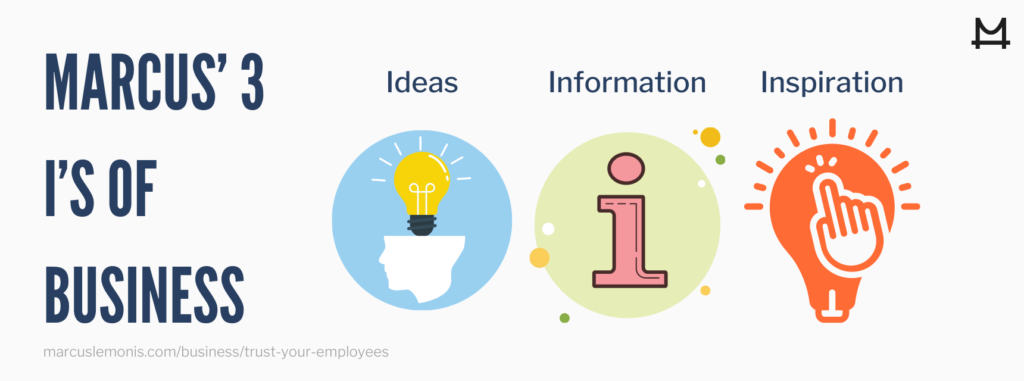
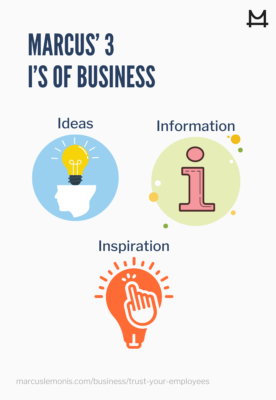
Delegate Important Tasks
- When you think about delegating, you might just think about the odds and ends. But you should also work towards delegating the important stuff. Because it’ll liberate your time so you can grow your business. The comfort to take that leap starts with the hiring process. Pay special attention not just to the candidate’s experience, but to their character traits. Look for self-starters, people who can work independently, and those who can manage projects. Because even if they aren’t in a supervisory role, you’ll feel more comfortable throwing them larger projects down the line. And if the very thought of that makes you a little nervous with a specific candidate, then maybe explore new options. Because the last thing you want is to turn yourself from an ambitious manager into a babysitter.

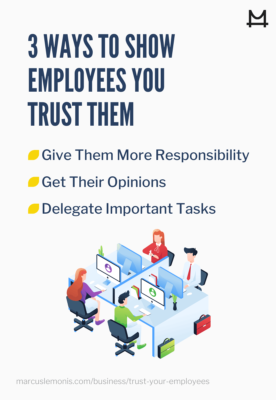
Why It Pays Off To Trust Your Employees
Enhances Employee Engagement
- When you trust your employees, they feel more ownership over their work product. That’s because they see more of themselves in it. You’re drawing a direct link between their input and output, increasing job satisfaction and engaging your employees. According to Gallup, companies with a high level of engagement are 21% more profitable. So, when you give your team a little more elbow room and ownership, you not only increase their job satisfaction, but your profits as well.

Increases Productivity
- Think about the least productive days you’ve had as a manager. Did you feel the need to chaperone someone to make sure they were doing their job? Did you spend time getting yourself up to speed because you weren’t sure about the information your team provided? Did you second-guess your delivery driver’s routes? Do you see how a lack of trust is the common denominator? You might be able to use automation to increase that trust and, in turn, productivity. That’s exactly what Marcus did when he visited a fresh flower delivery company in Southern California.
He installed GPS tracking on all of their trucks and automated the dispatch process. So, that meant no more keeping tabs on drivers, no more check-ins about delivery status, and more accountability on all sides. Think about similar ways your team can use technology to increase freedom and productivity.
Enables Flexible Working
- Deloitte, being in the professional services field, was always looking for ways to increase efficiency. That didn’t just go for their clients’ companies, but also their own. Deloitte tried to improve turnover internally, and in doing so, reimagined their company’s entire idea of an office. They rolled out a flexible work program that allowed for two serious perks. The first gave employees more input surrounding their work schedule and hours. And the next gave employees more freedom to work remotely. That show of trust paid off big-time, as Deloitte would go on to save over $41 million in turnover costs. Their employees spent less time commuting, enjoyed more work-life balance, and most importantly, they stayed.

Improves Communication
- You don’t need to be a PhD at Stanford to see how trusting your employees improves communication. But in Emma Seppala’s case, it sure did help. She’s a psychologist at the university. In her 2015 study, she noticed that by showing trust in their team, managers could actually stimulate the part of an employee’s brain that produces innovation. So, when a manager creates an encouraging environment to share ideas, they’re often repaid with great ones. Managers who show creative trust let employees feel comfortable taking the risks that lead to breakthroughs. So, make sure you cultivate a supportive place to brainstorm, because when your people aren’t afraid to hold back, their ideas might surprise you.
Helps Build Team Spirit
- Adobe is a software company and a shining example of what happens when you prioritize trust. They famously gave their employees a bunch of autonomy and had a strict policy against micromanaging. This created an atmosphere that was so healthy that the employees were eager to show it off. They basically turned into brand ambassadors, going so far as to launch a hashtag on social media that gave people a window into “the good life” at Adobe. This earned them a consistent home on Fortune’s “100 Best Companies to Work For” list. So, when you trust your employees, they just might want to tell the world.
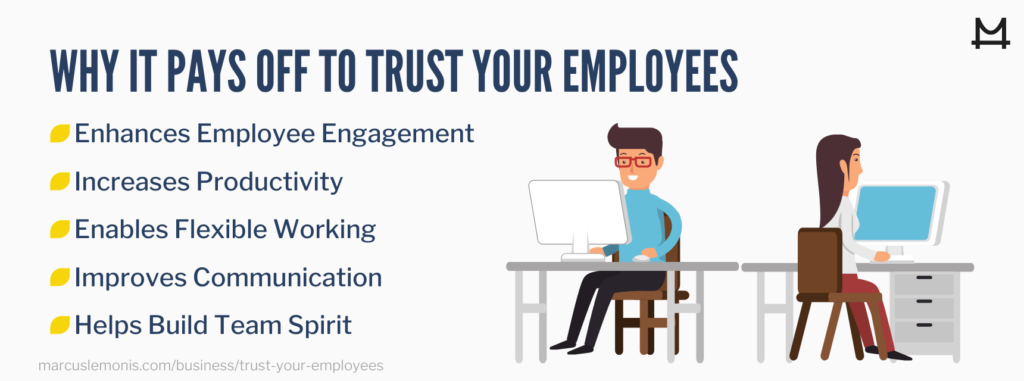
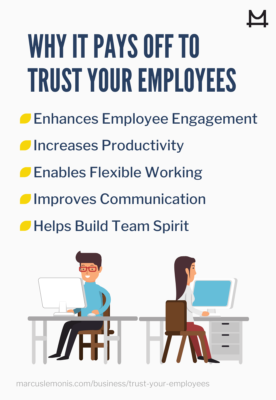
You’ve just taken in a lot of information about why you should trust your employees. So, if you want an easy way to remember the gist, think about the image of a campfire. When you smother the flame, it goes out. But when you fan the flames and actively encourage them, they grow to provide warmth and stability. Think of interacting with your team in similar terms. Constantly hovering over them might put out their light. But if you give them enough space, there’s no telling how much they’ll grow.
- What do you do to show your employees that you trust them?
- Are you going to change your behaviors in any way after reading this to show more trust to your employees?
Covey, S.M.R. & Conant, D.R. (2016, July 18). The connection between employee trust and financial performance.
Retrieved from
https://hbr.org/2016/07/the-connection-between-employee-trust-and-financial-performanceDeloitte.com. (n.d.). Flexible working: striking a balance.
Retrieved from
https://www2.deloitte.com/global/en/pages/about-deloitte/articles/gx-striking-a-balance.htmlGreat Place to Work. (n.d.). The business case for a high-trust culture [PDF file].
Retrieved from
https://s3.amazonaws.com/media.greatplacetowork.com/pdfs/Business+Case+for+a+High-Trust+Culture_081816.pdfKashyap, V. (2018, May 10). 8 companies with enviable company cultures.
Retrieved from
https://www.proofhub.com/articles/8-companies-with-enviable-company-culturesSorenson, S. (2013, June 20). How employee engagement drives growth.
Retrieved from
https://www.gallup.com/workplace/236927/employee-engagement-drives-growth.aspxWilliams, M. (2011, August 31). Trusting employees supports better performance, research finds.
Retrieved from
https://blog.shrm.org/workforce/trusting-employees-supports-better-performance-research-finds





